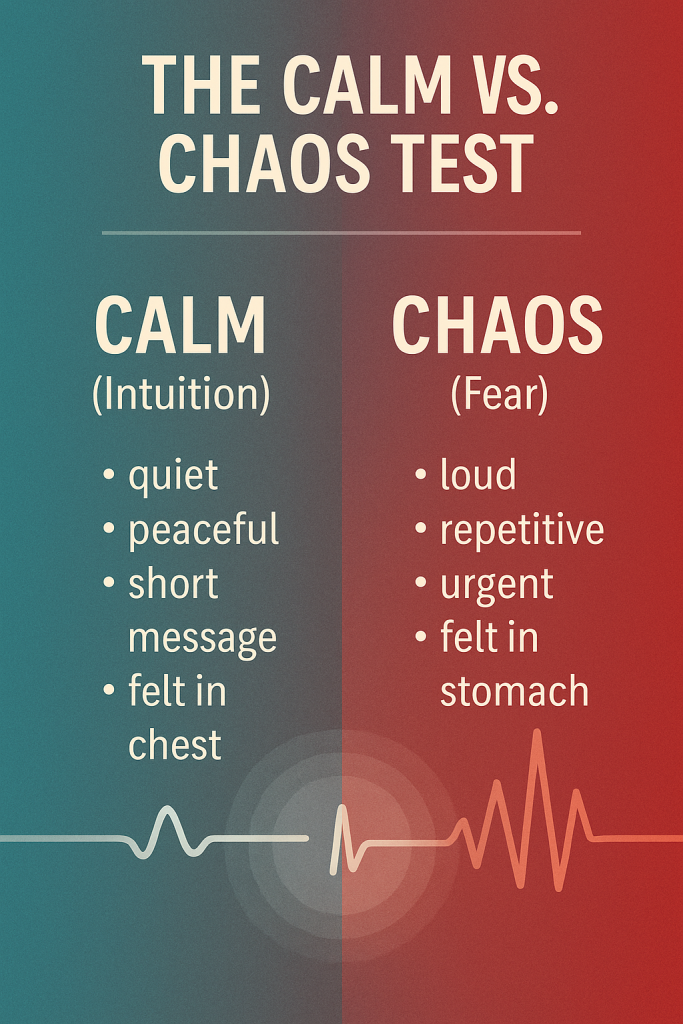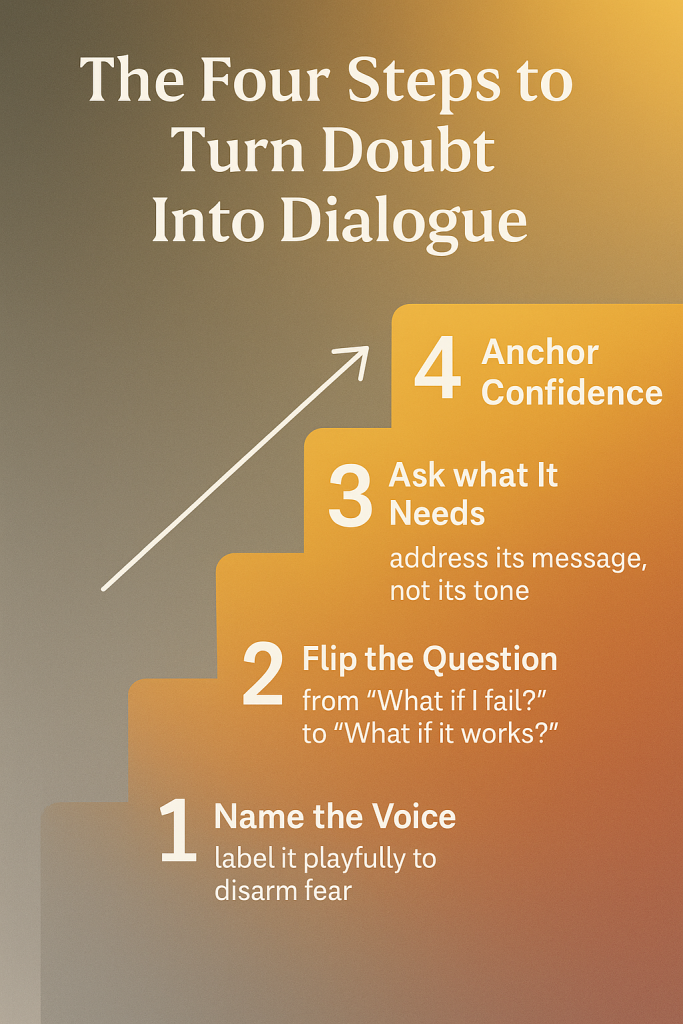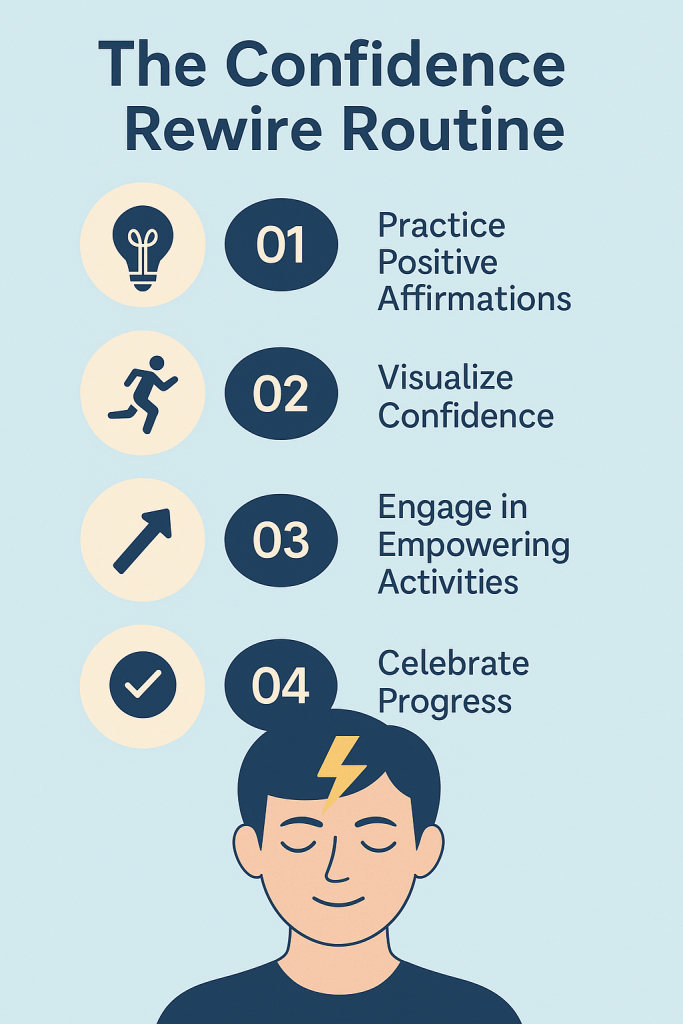The Inner Critic with a Megaphone
You know that voice in your head that says, “Who do you think you are?” It often shows up at the worst times—right before you try something bold, creative, or vulnerable. That voice isn’t your enemy; it’s your nervous system trying to protect you from imagined danger. Unfortunately, what once kept our ancestors safe from predators now keeps us safe from growth.
The truth is, self-doubt isn’t proof that you’re weak. It’s proof that you’re evolving. Doubt appears every time your energy shifts toward expansion, because parts of your psyche—and your aura—don’t yet recognize this new, upgraded version of yourself.
Psychics describe self-doubt as static energy in the intuition channel, where clarity gets muffled by fear. When you can learn to translate that static, you stop seeing doubt as failure and start seeing it as feedback. It becomes a spiritual GPS—warning that your next breakthrough is near.
According to research from Psychology Today, self-doubt is an emotional reflex triggered by uncertainty, not a reflection of your actual competence. That’s a scientific confirmation of what psychics have always known: intuition and insecurity often speak the same language, but come from completely different frequencies.
The Psychology Behind Doubt
From a scientific standpoint, self-doubt is an evolutionary feature, not a flaw. Neuroscientists have identified the brain’s negativity bias—our built-in tendency to focus more on what can go wrong than on what might go right. It’s a survival mechanism. A thousand years ago, it helped us avoid danger. Today, it makes us question our every move.
Every time you recall a failure, your brain’s pain centers light up just as if the event were happening again. This means your nervous system literally rehearses emotional injury, teaching your body to expect it. When psychics describe energy blockages that “loop” around old memories, they’re describing what psychology calls rumination. Both point to the same truth: repeating fear keeps you stuck in the past.
Social media intensifies this through what psychologists call the comparison effect—a constant stream of highlight reels that trick our brains into believing everyone else is thriving. It creates an illusion of inadequacy that drains confidence and energetic flow.
The psychic interpretation? You’re letting external energy override your internal frequency. Whether you call it conditioning or vibration, the fix is the same: retrain your focus from what’s missing to what’s possible.
The Energetic Side of Self-Doubt
On an energetic level, doubt is a solar plexus issue. This chakra—located around your stomach—governs confidence, personal power, and decision-making. When its energy dims, you experience hesitation, low motivation, or the feeling that success will slip through your fingers.
Many intuitives and empaths mistake this energetic imbalance for personality weakness. But what’s really happening is energetic overload. Sensitive people unconsciously absorb the self-doubt of others and misinterpret it as their own.
As described by MindBodyGreen, energy healing focuses on releasing these lower frequencies so that your intuition can operate without interference. Practices like breathwork, grounding, and visualization literally recalibrate your biofield—the subtle electromagnetic field that extends from the body.
Try this quick exercise: stand barefoot, inhale deeply, and imagine a golden thread connecting your navel to the Earth’s core. Exhale and visualize gray smoke leaving your body. This isn’t woo-woo; it’s regulation. You’re teaching your nervous system to associate stability with power.
When Intuition and Fear Sound the Same
Here’s a truth even professional psychics admit: intuition and fear often sound identical at first. Both produce gut sensations, both influence decision-making, and both can feel urgent. The difference lies in texture.
Intuition speaks calmly and concisely. It’s a quiet inner knowing that doesn’t need to justify itself.
Fear shouts. It demands constant analysis, running endless “what ifs.”
To tell the difference, use the Calm vs. Chaos Test:
When a thought arises, ask yourself, “Does this make my body feel calm or tight?” Intuitive messages leave a sense of peace—even when the action feels bold. Fear-based thoughts create physical tension or racing heartbeats.

This aligns with research from the HeartMath Institute on heart-brain coherence. When your emotional state is aligned (coherent), your intuition is stronger and decision-making improves. When your energy is incoherent (stress response active), fear hijacks intuition’s microphone.
A psychic might say your “frequency is off.” A psychologist might say your amygdala is overstimulated. Both point to the same solution: regulate, ground, and listen for the calm voice beneath the chaos.
Case Study 1: The Artist Who Ignored Her Intuition
Lucía, a painter, spent years struggling to finish her work. Every time she picked up a brush, she heard that internal critic: “You’re not talented enough.” During a psychic reading, her reader described a gray haze surrounding her solar plexus and asked, “Who made you believe your art had to be perfect to matter?”
Lucía immediately recalled her first art teacher, who once said her colors were “too emotional.” That comment had lived rent-free in her energy for over a decade. Once she realized the self-doubt wasn’t hers but borrowed energy, she painted freely again. Her work later appeared in a local gallery.
Psychic insight didn’t fix her—it freed her.
The Role of Belief and Frequency
Self-doubt doesn’t just affect mood—it affects vibration. In both psychology and metaphysics, belief determines perception. What you believe, you broadcast.
From a neuroscience angle, your brain operates on electrical frequencies. Positive self-talk strengthens neural pathways associated with confidence, while negative self-talk deepens fear-based circuits. From an energetic perspective, belief determines resonance—the level at which your aura vibrates and attracts experiences that match it.
When a psychic says “You need to raise your frequency,” they’re essentially encouraging neural reframing. Studies on heart coherence from the HeartMath Institute show that synchronized heart and brain rhythms enhance clarity, intuition, and problem-solving. It’s physics and mysticism shaking hands.
Belief, then, becomes an energetic permission slip. Doubt withdraws permission. That’s why shifting from “Can I?” to “I am learning to” can literally change your energetic state.
Practical Framework: Turning Doubt Into Dialogue

Step 1: Name the Voice
When doubt speaks, give it a name—something slightly ridiculous, like “Negative Nancy.” Humor detaches you from fear’s grip.
Step 2: Ask Your Energy What It Needs
Place your hand over your stomach and ask silently, “What would help me feel stronger right now?” The answer might be rest, boundaries, or a creative outlet.
Step 3: Flip the Question
Instead of asking “What if I fail?”, ask “What if it works?” This reverses your brain’s threat detection loop.
Step 4: Anchor Through Visualization
Picture a golden sun glowing inside your chest. Each time you take a confident action—no matter how small—see that light grow. Visualization isn’t fantasy; it’s energetic rehearsal.
Case Study 2: The Entrepreneur Who Listened to Her Gut
Tara, a small business owner, came to a psychic feeling paralyzed by indecision. Her readings kept pointing to the same phrase: “Your intuition already decided.” She just didn’t trust it.
Together, they unpacked the fear. Tara realized her self-doubt came from early-life criticism about being “too impulsive.” Once she reframed intuition as inner strategy, not chaos, her decision-making sharpened. Within six months, her new product line became her company’s best-seller.
Her psychic didn’t give her answers—she gave her back her agency.
Humor and Humanity in the Process
Everyone battles self-doubt, even psychics. The difference is that intuitives treat it like weather—temporary, not personal. Doubt isn’t a sign you’re broken; it’s proof you’re alive and evolving.
Sometimes, laughing at your fear disarms it faster than any mantra. One psychic calls her inner critic “Debbie Downer” and imagines her wearing clown shoes. Humor restores energetic flow by lowering cortisol and softening your field.
So when doubt visits, don’t banish it—banter with it. That lightness raises your vibration instantly.
The Spiritual Lesson Behind Doubt
Doubt isn’t punishment; it’s initiation. Every major life upgrade—career change, new love, creative breakthrough—comes with an energetic exam: “Do you trust yourself yet?”
Psychics often say that spirit guides send micro-challenges to strengthen discernment. The lesson isn’t “don’t doubt”—it’s “don’t stop at doubt.”
This overlaps with consciousness research explored in Scientific American, which describes awareness as a feedback system that refines itself through observation. The same principle applies spiritually: self-awareness transforms doubt into wisdom.
Case Study 3: The Relationship Doubt Reading
A woman named Erin felt anxious about her long-term partner. Her psychic picked up that the real tension wasn’t about the partner at all—it was residue from her previous heartbreak. Once Erin understood the source, she stopped projecting old fears onto her current relationship. Her connection deepened almost overnight.
Psychic insight didn’t replace therapy; it complemented it. By acknowledging the energetic roots of her doubt, Erin reclaimed emotional clarity.
Everyday Exercises to Rewire Confidence

Energy Hygiene – Start each morning visualizing a shower of light washing off worry.
Journaling Prompts – Write: “What does my doubt want to protect me from?”
Golden Core Visualization – Picture a glowing sphere inside your solar plexus expanding with each breath.
Grounding Practice – Spend a few minutes outdoors, feeling your feet and noticing sensory detail.
These small actions, repeated daily, train both your brain and aura to associate calmness with courage.
When to Seek Help (and When to Trust Yourself)
Self-doubt can be heavy, especially when mixed with trauma or burnout. That’s when combining therapy and psychic insight works best. A therapist helps untangle the mental narrative; a psychic tunes into the energetic root.
When seeking a reader, choose one with clear ethics and practical guidance. Trusted platforms like PsychicOz.com screen their advisors to ensure you receive grounded insight rather than vague promises.
Learning when to trust your intuition and when to seek external clarity is part of mastering emotional intelligence—the most psychic skill of all.
Conclusion: The Frequency of Self-Trust
Getting past self-doubt isn’t about eliminating fear; it’s about tuning your energy higher than its frequency. Psychics and psychologists agree: the more self-aware you are, the quieter doubt becomes.
Every confident person you admire once stood where you are now—uncertain, nervous, but curious enough to listen to their intuition anyway. The next time self-doubt shows up, thank it for trying to keep you safe, then let it watch while you do the thing anyway.
Confidence isn’t built in the absence of doubt—it’s built in defiance of it.
FAQs: How to Get Past Self-Doubt
What is self-doubt, really?
A protective reflex from your nervous system that overestimates risk; it’s not a verdict on your talent or worth.Why does self-doubt hit hardest right before big opportunities?
Growth triggers uncertainty; your brain flags change as “danger,” so the inner critic gets louder.Is self-doubt the same as humility?
No. Humility is accurate self-appraisal; self-doubt is distorted safety-seeking that shrinks action.How do I tell intuition from fear?
Intuition is calm, brief, and steady; fear is loud, repetitive, and urgent. Check how your body feels after the message.Can sensitive or empathic people feel other people’s doubt?
Yes. Empaths can absorb ambient anxiety and misread it as their own; grounding and energy hygiene help.What’s the solar plexus and why does it matter?
It’s the energy center of self-belief and personal power. When underactive, confidence and decisiveness drop.What daily practice lowers self-doubt fastest?
A short routine: breath to regulate, quick visualization to prime confidence, and one small courageous action.Does journaling really help?
Yes. Naming the doubt reduces its power and creates space for problem-solving and self-compassion.What’s the “Calm vs. Chaos Test”?
Ask a question, notice your body: calm expansion suggests intuition; tightness and racing thoughts point to fear.Can I reframe lifelong perfectionism?
Practice “good enough to ship,” set time-boxed sprints, and celebrate progress, not polish.How do I stop comparing myself online?
Set app limits, follow creators who normalize process, and track your own inputs and outcomes weekly.What role do beliefs play in confidence?
Belief sets your brain’s filter and your energetic “broadcast,” shaping the options you notice and choose.How can breathwork change self-doubt?
It shifts your physiology from threat to safety, allowing clearer thinking and access to intuition.What if I’ve failed before?
Use “learning loops”: identify one lesson, one experiment, one metric. Progress beats perfection.How do I handle imposter syndrome at work?
Document wins, rehearse evidence-based self-talk, and seek “stretch” projects with defined support.Are mantras useful or just fluff?
Short evidence-backed cues work: “I do hard things” paired with a tiny action wires confidence faster than long affirmations.How can a psychic reading help with doubt?
A reader can distinguish fear from intuition, surface energetic blocks, and reflect timing windows you might ignore.Won’t readings make me dependent?
Ethical readers emphasize agency, integration time, and practical steps—insight plus action.How do I build trust in my inner voice?
Run micro-experiments: follow a small intuitive nudge, log the outcome, repeat. Data builds faith.What if my family or culture discourages risk?
Create a “brave circle” of supportive peers and mentors; borrow belief until your own stabilizes.How do I stop overthinking decisions?
Use the 3-option rule, a deadline, and one reversible step. Clarity grows after movement.Can exercise reduce self-doubt?
Yes—movement lowers cortisol, boosts mood, and signals capability, which your brain generalizes.What if anxiety feels physical?
Address the body first: hydration, breath, grounding, and sleep. Then re-evaluate the thought.How do I speak up when I’m scared?
Prepare one key point, one ask, one benefit for the listener. Say it early in the conversation.What’s a fast reset before a big moment?
Inhale 4, hold 4, exhale 8, twice. Visualize golden light at your core expanding as you act.How can spirituality support confidence?
Rituals create safety cues for the nervous system and meaning for the mind, aligning intention and energy.How often should I seek guidance?
When there’s a new question or pattern—then pause to implement. Insight needs integration.How do I measure progress?
Track behaviors: attempts, submissions, conversations, and recovery time after setbacks.What if doubt returns after success?
Normalize it. Level-ups bring new edges. Reuse your tools; you’re not back at zero—you’re advancing.What’s one thing I can do today?
Choose a 10-minute brave action that moves a priority forward. Confidence follows evidence.





The exploration of self-doubt’s effects on personal and professional life is well-articulated. By encouraging readers to take charge of their lives and focus on positive self-reinforcement, the article provides a roadmap for building self-confidence.
Understanding that self-doubt can stem from past experiences and relationships is a significant step toward overcoming it. The article’s recommendations for positive self-improvement practices, such as celebrating small victories and setting boundaries, are well-founded.
The article provides a comprehensive overview of self-doubt and its impact on individuals’ lives. It is crucial to identify the sources of such feelings to address them effectively. The emphasis on overcoming self-doubt through self-awareness and positive affirmations is particularly insightful.
This piece highlights the pervasive nature of self-doubt and how it can hinder personal growth. The suggestions for managing self-doubt, like surrounding oneself with supportive people and being mindful of self-talk, are both practical and actionable.
What a profound and impactful article! The insights shared about self-doubt are incredibly enlightening and resonate deeply. It’s empowering to realize that we have the ability to overcome these negative thoughts and reclaim our self-worth. The practical advice provided is invaluable, particularly the emphasis on surrounding oneself with positive influences and engaging in self-compassion. Truly a must-read for anyone struggling with self-doubt.
The discussion on the origins of self-doubt, such as childhood experiences and trauma, aligns with various psychological studies. The practical advice on overcoming these feelings by focusing on positive self-talk and taking risks can be beneficial for many.
Comments are closed.